[date of last update]
www.Rewriting-History.org
FACEBOOK PAGE
US SCREENING TOUR 2013
[date of last update]
www.Rewriting-History.org
FACEBOOK PAGE
US SCREENING TOUR 2013
A number of viewers of the new Australian documentary film Rewriting History, by Marc Radomsky and Danny Ben-Moshe, have submitted to Defending History near-identical transcripts of a statement on camera, made to the film’s producers, by the executive director of the “International Commission for the Evaluation of the Crimes of the Nazi and Soviet Occupation Regimes in Lithuania.”
Known for short as the “red-brown commission,” the state-sponsored body has long been opposed by Holocaust survivors and educators. The commission is responsible for Holocaust education in Lithuania, but has also taken an active political role in promoting the 2008 Prague Declaration and various details of alleged “equality” of Nazi and Soviet crimes. The commission’s website features the Prague Declaration in both English and Lithuanian.
The commission’s executive director, Ronaldas Račinskas, is quoted as saying on camera that his commission does not support “Double Genocide” but that he does support the 2008 Prague Declaration (though he concedes there are passages to be “discussed”). The problem is that the Prague Declaration is the primary document of the Double Genocide movement in Europe.
See also: Mr. Račinskas’s 2011 speech in the Lithuanian parliament; Critiques of his commission; 2015 Update: His call for investigations of Holocaust survivors who joined up with the anti-Nazi partisans.
Mr. Račinskas goes on to say, according to the transcripts provided of his Rewriting History interview:
Last Thursday, 3 November, an article I’d submitted to the Jerusalem Post for consideration appeared on the op-ed page (PDF of the print edition here). In democratic societies, sending an opinion piece to a respectable publication, signing it with one’s real name, and opening it (and oneself) to further open debate and discussion are rather standard. As usual, I linked to the article on my Facebook page, expecting some to agree and some to disagree, moving debate forward.
But a number of Facebook Friends who did not react on my page, or any other open forum, did for some reason find it appropriate to join a kind of witch hunt against the article and its author on a page of a “Secret Group” called Lietuva be neonacizmo (Lithuania Without Neo-Nazism), located at: www.facebook.com/groups/135816956486382.

The original discussion of 3 and 4 November 2011 is available here. A full English translation is appended below and is also available as PDF.
Delfi.lt journalist Eglė Samoškaitė reported today on this week’s book event for the Lithuanian language edition of Timothy Snyder’s Bloodlands, held at the Foreign Ministry and with the participation of some leading historians and heads of institutions in the country. A full English translation of Ms. Samoškaitė’s article is available here.
O P I N I O N
by Dovid Katz
When you have loved an institution all your life — and written over decades about its impact on the history of ideas — it becomes a responsibility, even when painful, to try to dissuade it from making a serious error that would put in jeopardy its integrity.
The Lithuanian foreign minister, who has to date not apologized publicly for his widely reported antisemitic outburst in October 2010, has been named by the Yivo Institute for Jewish Research as its ‘guest of honor’ at a concert on 22 September 2011. The remnant Jewish community of Lithuania is small and fragile. Nevertheless it responded robustly, less than a year ago, to the foreign minister’s comments and proceeded to publish its response in English, Lithuanian, Russian and Yiddish.
Yivo’s website enumerates the joint sponsorship for the 22 September 2011 event by ‘the Embassy Series in cooperation with the Lithuanian Consulate and the Lithuanian Delegation to the United Nations’. The event is being held to commemorate the anniversary of the liquidation of the Vilna Ghetto on 23 September 1943.
In 2011 — to mark the 70th anniversary of Hitler’s invasion, and to the chagrin of Holocaust survivors internationally — the Lithuanian government has invested in a series of events honoring the local perpetrators who began to kill Jewish neighbors in dozens of towns before the Germans even arrived (a reading list on the history is available here). The ‘logic’ has been that they were actually rebelling against Soviet rule, though it is not disputed by historians that the Soviets were obviously fleeing the Nazi invasion.
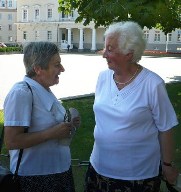 marked three years to the day since police in Vilnius came looking for Holocaust Survivors Dr Rachel Margolis (born 1921, at right of photo) and Fania Yocheles Brantsovsky (born 1922) in a ‘war crimes investigation’ that has still not been publicly closed.
marked three years to the day since police in Vilnius came looking for Holocaust Survivors Dr Rachel Margolis (born 1921, at right of photo) and Fania Yocheles Brantsovsky (born 1922) in a ‘war crimes investigation’ that has still not been publicly closed.
Both women were incarcerated in the Vilna Ghetto from 1941 to 1943. Both lost their entire families to the barbarity of the Nazis and their local collaborators. They both escaped, on different days in September 1943, to join up with the anti-Nazi partisans in the forests of Lithuania. The underground forest fort, a half-hour’s drive from Vilnius, the Lithuanian capital, where Fania lived with another hundred or so Jewish escapees of the Vilna Ghetto, is being allowed to sink into the ground and disappear from history’s view.
Retired Vilnius University lecturer Irena Tumavičiūtė, whose 29 January 2008 article in the antisemitic newspaper Lietuvos aidas is credited with egging on right-wing parliamentarians and prosecutors to ‘go for’ Holocaust Survivors Fania Yocheles Brantsovsky and Dr Rachel Margolis, has published a new article on the Holocaust, concentrating on Auschwitz, in the popular mainstream magazine Veidas. It appeared in the magazine’s January 10th issue.
O P I N I O N
by Dovid Katz
“Also, it has been started to require the sentence of the citizens of the Jewish nationality ― Yitzhak Arad, Fania Brantsovsky and Rachel Margolis, as these citizens (former Soviet guerrillas) have organized the massive slaughter of civilians in Kaniūkai Village, Lithuania (killing 38 civilians) on 29 January 1944. Attention should be paid to the fact that the very Y. Arad has departed to Israel.” — from the statement just published by the Lithuanian Human Rights Association (LHRA), signed by ten of its leading experts and approved by its committee.
BNS reported today that the Vilnius-based ambassadors of Britain, Estonia, France, Finland, Netherlands, Norway and Sweden have written in no uncertain terms to the president and other major officials of Lithuania to express concern over the growing manifestations of antisemitism.
Two of the signatories confirmed privately to Defending History that the initiative had come from British ambassador HE Simon Butt, who also drafted the letter. Ambassador Butt had in 2008 organized a letter in moral support of Dr. Rachel Margolis, a walk through the Vilna Ghetto with Ms. Fania Brantsovsky, and had, together with other senior Western diplomats stationed in Vilnius, visited the decaying Jewish partisan fort in the forest.
“Spurious attempts are made to equate the uniquely evil genocide of the Jews with Soviet crimes against Lithuania, which, though great in magnitude, cannot be regarded as equivalent in either their intention or result.”
Excerpt from a letter to the president of Lithuania from the ambassadors of Britain, Estonia, Finland, France, Netherlands, Norway and Sweden, 25 November 2010
The Green House, as the Holocaust exhibit of the Vilna Gaon Jewish State Museum of Lithuania is internationally known, was formally relaunched today in Vilnius after a closure of several months for renovations, technical upgrading of a number of exhibits and the addition of video screens and other facilities.
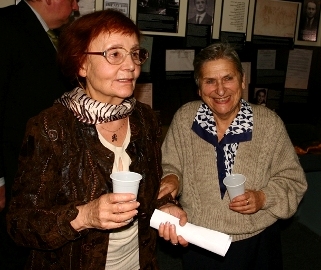
Rachel Kostanian (left) and Fania Yocheles Brantsovsky celebrate at the Green House’s Relaunch. Photo: Sebastian Pammer.
In a massive show of support for Rachel Kostanian, its beloved guardian and director since its inception over two decades ago, the diplomatic corps came out in force, including the ambassadors of Austria, France, Germany, Japan, Norway, UK and chargés d’affaires or consuls of Bulgaria, the Netherlands and the United States. There was a sense of relief that Ms Kostanian and her staff had succeeded to preserve not only the vast majority of images, texts and topics from the venerated old exhibit, but also its key message of straight-talking Holocaust studies that stays clear of the obfuscating discourse of ‘artificial balances, mitigations and excuses’ that runs rampant in this part of Europe.
Sir Martin Gilbert has today authorized publication of his 24 August 2008 letter to this journal’s (future) editor. The facsimile follows. The letter had confirmed his April 2008 resignation from the “International Commission for the Evaluation of the Crimes of the Nazi and Soviet Occupation Regimes in Lithuania” (known informally and for brevity as the “Red-Brown Commission”), citing the Yitzhak Arad affair.
In view of the subsequent developments, the 24 August letter also cites the need for the Commission to condemn the defamation of additional Holocaust survivors Fania Yocheles Brantsovsky, Professor Sara Ginaite, and Dr. Rachel Margolis. Professor Gilbert’s authorization for publication came after the Commission’s website failed to remove his name from the list of members in spite of his resignation on principle.
◊
Fania Yocheles Brantsovsky, born in 1922, who lost her entire family in the Holocaust, escaped the Vilna Ghetto several moments before it was encircled by police preparing for its final liquidation on 23 September 1943. Together with Dobke Develtov [update: who passed away in 2012 in Los Angeles], she made it to this underground anti-Nazi partisan fort that was home to fighters aligned with the Soviet partisans. The precise number of inhabitants varied with newcomers and deaths in battle. Fania remembers at one time 99 of 101 were Jewish Vilna Ghetto escapees, at another 101 of 107. An underground bunker like this was home until the fall of Nazi rule in July 1944.
Along with other Holocaust Survivors who resisted — including Yitzhak Arad and Rachel Margolis — Ms Brantsovsky, librarian of the Vilnius Yiddish Institute, has in recent years been the object of a campaign of defamation and harassment in Lithuania.
The antisemitic press has targeted her (January 2008). Armed police came to search for her (May 2008). Prosecutors told the press she could not be found (May 2008). The editor of Lithuania’s main news portal called for her to be tried (May 2009). The mainstream media, citing ruling-party members of Lithuania’s parliament, branded her a war criminal (Oct 2009). And one of the country’s leading associations for human rights (!) demanded that she and other Jewish partisan veterans be ‘sentenced’ for committing ‘a massive slaughter’ (Dec. 2010).
All in the absence of any charge or iota of evidence.
◊
Fania Yocheles Brantsovsky, born in 1922, who lost her entire family in the Holocaust, escaped the Vilna Ghetto several moments before it was encircled by police preparing for its final liquidation on 23 September 1943. Together with Dobke Develtov [update: who passed away in 2012 in Los Angeles], she made it to this underground anti-Nazi partisan fort that was home to fighters aligned with the Soviet partisans. The precise number of inhabitants varied with newcomers and deaths in battle. Fania remembers at one time 99 of 101 were Jewish Vilna Ghetto escapees, at another 101 of 107. An underground bunker like this was home until the fall of Nazi rule in July 1944.
Along with other Holocaust Survivors who resisted — including Yitzhak Arad and Rachel Margolis — Ms Brantsovsky, librarian of the Vilnius Yiddish Institute, has in recent years been the object of a campaign of defamation and harassment in Lithuania.
The antisemitic press has targeted her (January 2008). Armed police came to search for her (May 2008). Prosecutors told the press she could not be found (May 2008). The editor of Lithuania’s main news portal called for her to be tried (May 2009). The mainstream media, citing ruling-party members of Lithuania’s parliament, branded her a war criminal (Oct 2009). And one of the country’s leading associations for human rights (!) demanded that she and other Jewish partisan veterans be ‘sentenced’ for committing ‘a massive slaughter’ (Dec. 2010).
All in the absence of any charge or iota of evidence.
“I dream that good people from all over the world will not forget the Holocaust in Lithuania or our struggle to stay alive and to fight the Nazis and their collaborators, that for generations to come they will make their way here to look and see where we, a hundred Vilna Ghetto survivors who lost our entire families, lived, loved, fought, and dreamt of a better tomorrow.” — Fania Yocheles Brantsovsky
Algirdas Brazauskas (1932-2010), visionary first elected president and later prime minister of free Lithuania died today in Vilnius. In each of his land’s highest offices he proved himself a leader in the grand spirit of the multicultural Grand Duchy of Lithuania who will be properly appreciated long after our time.
From the start of Lithuania’s new history as a proud democratic nation, Algirdas Brazauskas understood that it did no good for his country that war criminals had been rehabilitated by ultranationalist officials.
He paid tribute to Jewish partisan veterans for helping to free Lithuania from Nazi tyranny. As president, he honored Prof Dov Levin. As prime minister, he issued a certificate of recognition to Dr Rachel Margolis.
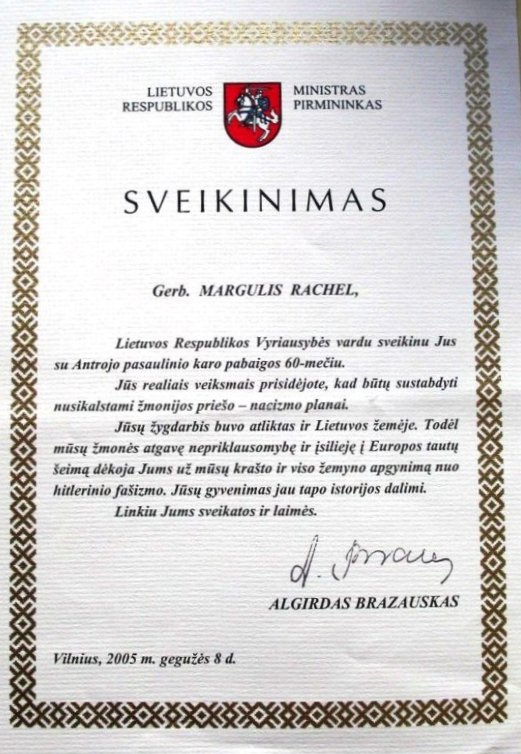
President Brazauskas’s historic speech to the Israeli Knesset in Jerusalem on 1 March 1995 will never be forgotten (full text here). 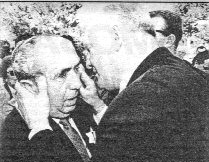 But in modern Litvak collective memory, there is perhaps one incident, that took place one day before, that will be remembered even more. The Lithuanian delegation was met by a picket line of Holocaust survivors near Yad Vashem. One elderly survivor, Y. Brosh, whose entire family was murdered at Ponar, made his feelings known robustly. Like the other survivors who protested, he was wearing a yellow star on his jacket. President Brazauskas went over to to the man, hugged him and kissed him.
But in modern Litvak collective memory, there is perhaps one incident, that took place one day before, that will be remembered even more. The Lithuanian delegation was met by a picket line of Holocaust survivors near Yad Vashem. One elderly survivor, Y. Brosh, whose entire family was murdered at Ponar, made his feelings known robustly. Like the other survivors who protested, he was wearing a yellow star on his jacket. President Brazauskas went over to to the man, hugged him and kissed him.
On the occasion of Holocaust Remembrance Day, the Margolis family in the United States released to the media a 3 December 2009 letter from the United States Congress to the prime minister of Lithuania, protesting in no uncertain terms the campaign being waged against 88 year old historian, museum builder and biologist, Dr Rachel Margolis; 87 year old Fania Yocheles Brantsovsky, librarian of the Vilnius Yiddish Institute; and 83 year old Holocaust scholar Dr Yitzhak Arad, who was founding director of Yad Vashem. All three have been the subject of ongoing ‘investigations into war crimes’ by Lithuanian prosecutors and of extensive defamation by the country’s mainstream media. Since the saga got underway in the spring of 2006, none has been charged, and not one has been cleared. Holocaust studies specialists increasingly suspect a ruse to create a bogus paper trail of ‘investigations’ of Holocaust survivors as a diversion to the documented history of massive Baltic participation in the Nazi-led genocide of the Jewish population, as well as to the region’s dismal record of not punishing a single Nazi war criminal since independence. See the media coverage; responses to the anti-survivor campaign; critiques of the underlying ‘red=brown’ movement and the state-funded apparatus that underpins it.
◊
This essay first appeared in Transitions on Line on 10 October 2008, with the following editor’s note: “Lithuanian authorities in late September closed their two-year investigation into the wartime partisan activities of Yitzhak Arad, a Lithuanian-born Israeli historian and a former head of the Yad Vashem Holocaust memorial, reportedly on the urging of the European Union and the United States. Prosecutors said there was insufficient evidence to link Arad to possible war crimes committed by Soviet partisans during a 1944 fight with German forces that left many Lithuanian civilians dead. The authorities are still considering whether to put two Lithuanian Jewish women, Fania Brantsovskaya (Brantsovsky) and Rachel Margolis, on the witness stand in connection with the killings.”
It is republished here with Professor Donskis’s permission. For a history of the issue, see our page on the subject of Holocaust survivors defamed by prosecutors.
See more of Professor Donskis’s work in Defending History.
A disturbing tendency has recently appeared in Lithuania. In the words of the eminent scholar of Yiddish Dovid Katz, this tendency may best be described as the “Holocaust Obfuscation movement.” Its essence lies in subversion of the logic and evidence of the Holocaust, whitewashing or at least selectively reading the history of the Second World War and drastically shifting the roles of victims and evil-doers.
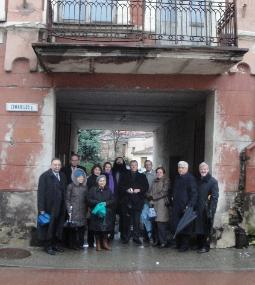
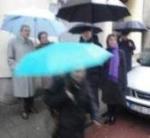
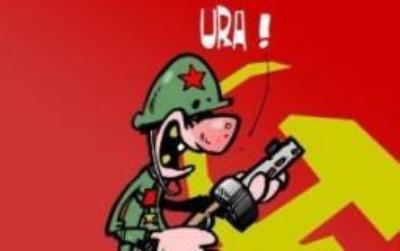 Minutes after the German Embassy in Vilnius issued a press release announcing that it had awarded Germany’s Federal Cross of Merit to Holocaust survivor Fania Yocheles Brantsovsky (born 1922), Lithuania’s main news portal, Delfi.lt, published a bileful attack replete with libelous and ridiculous accusations about her ‘war crimes’ (in effect trying to blame the Holocaust’s victims, a frequent ploy of the Baltic region’s Double Genocide Industry that is pushing the Prague Declaration in the European Parliament). The campaign against Holocaust survivors was launched by the antisemitic press and picked up by state prosecutors, starting in 2006 (see Blaming the Victims and the 28 Oct 2009 entry on the home page). English translation. The Lithuanian original appeared with this caricature of anti-Nazi resistance veteran Brantsovsky, librarian of the Vilnius Yiddish Institute, whose entire family perished in the Holocaust. It is not known why the Yiddish institute’s website contains no mention of the award, or of the unseemly attack against its own beloved librarian, who has been with the VYI since its inception in 2001. Speculation has centered on pressure ‘from above’ and fear of falling into disfavor with powers that be. On a related note, there is growing international interest in preservation of the underground partisan fort where Fania lived from September 1943 until the region’s liberation in July 1944. Authorities in the country seem to wish the fort to disappear. Fania is the country’s last Holocaust survivor who actually lived there. She continues to accompany visitors and students there. The international effort to save this remarkable Holocaust site is spearheaded by Samuel Gruber’s Jewish Art & Monuments site.
Minutes after the German Embassy in Vilnius issued a press release announcing that it had awarded Germany’s Federal Cross of Merit to Holocaust survivor Fania Yocheles Brantsovsky (born 1922), Lithuania’s main news portal, Delfi.lt, published a bileful attack replete with libelous and ridiculous accusations about her ‘war crimes’ (in effect trying to blame the Holocaust’s victims, a frequent ploy of the Baltic region’s Double Genocide Industry that is pushing the Prague Declaration in the European Parliament). The campaign against Holocaust survivors was launched by the antisemitic press and picked up by state prosecutors, starting in 2006 (see Blaming the Victims and the 28 Oct 2009 entry on the home page). English translation. The Lithuanian original appeared with this caricature of anti-Nazi resistance veteran Brantsovsky, librarian of the Vilnius Yiddish Institute, whose entire family perished in the Holocaust. It is not known why the Yiddish institute’s website contains no mention of the award, or of the unseemly attack against its own beloved librarian, who has been with the VYI since its inception in 2001. Speculation has centered on pressure ‘from above’ and fear of falling into disfavor with powers that be. On a related note, there is growing international interest in preservation of the underground partisan fort where Fania lived from September 1943 until the region’s liberation in July 1944. Authorities in the country seem to wish the fort to disappear. Fania is the country’s last Holocaust survivor who actually lived there. She continues to accompany visitors and students there. The international effort to save this remarkable Holocaust site is spearheaded by Samuel Gruber’s Jewish Art & Monuments site.